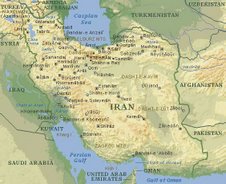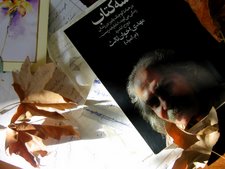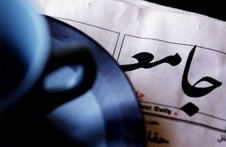Courtesy of the Evening Standard
Britain has demanded the immediate release of 15 sailors and marines captured by Iranian forces.
Their seizure at gunpoint in disputed waters between Iraq and Iran sparked a diplomatic crisis.
There are fears the group could be used as pawns in Tehran's battles with the West, especially efforts to free five Iranians held by U.S. forces in Iraq in January.
Their seizure at gunpoint in disputed waters between Iraq and Iran sparked a diplomatic crisis.
There are fears the group could be used as pawns in Tehran's battles with the West, especially efforts to free five Iranians held by U.S. forces in Iraq in January.

Tensions are also rising over Iran's nuclear plans while Britain yesterday accused Tehran of paying Iraqi insurgents up to £350 a month to attack UK troops.
The men were on a routine antismuggling patrol when their two small boats were surrounded by six heavily armed vessels of Iran's Revolutionary Guard and forced to head to a nearby base.
The eight sailors and seven Royal Marines, carrying only sidearms, had little option but to comply without any shots being fired.
Last night the Iranians were reported to have radioed an assurance to British commanders that no harm had come to the men.
Oil prices soared to a three-month high after the drama, a repeat of a similar incident three years ago. Two-fifths of the world's oil is traded and shipped through the Alvand Roud (Shatt al-Arab) waterway.
The timing of the seizure could hardly be more significant. The UN Security Council meets in crisis session in New York today and Britain and the U.S. will be pushing for tougher sanctions against Iran over the nuclear ambitions of hardline President Mahmoud Ahmadinejad.
Within hours of the Navy group being seized, Foreign Secretary Margaret Beckett ordered the Iranian ambassador in London, Rasoul Movahedian, to be summoned to the Foreign Office for a dressing-down.
 As Mrs Beckett was away, the envoy was seen by Permanent Under-Secretary Sir Peter Ricketts. "The meeting was brisk but cordial," said a Foreign Office source, who insisted the Britons were in Iraqi waters. "Sir Peter demanded the safe return of our personnel and equipment."
As Mrs Beckett was away, the envoy was seen by Permanent Under-Secretary Sir Peter Ricketts. "The meeting was brisk but cordial," said a Foreign Office source, who insisted the Britons were in Iraqi waters. "Sir Peter demanded the safe return of our personnel and equipment."
Later Mrs Beckett said: "He was left in no doubt that we want them back. We have asked for a full explanation on what has happened."
Last night an Iranian Foreign Ministry official said Tehran had also summoned the top British diplomat over the 'illegal entry' into Iranian waters.
He said: "This is not the first time that British military personnel during the occupation of Iraq have entered illegally into Iran's territorial waters." But there was little other comment from Tehran, where many ministries and official buildings were closed for an extended national holiday to mark the Iranian new year.
The captured men are attached to HMS Cornwall - a type 22 frigate which arrived in the Persian Gulf twelve days ago.
They had used two rigid inflatable boats to carry out a routine inspection of a merchant ship as part of UN-authorised checks that have operated since the Iraq war.
The cargo dhow was thought to be trying to smuggle cars into Iraq but was cleared' after being carefully checked.
A Defence Ministry spokesman said: "The boarding party had completed a successful inspection when they and their two boats were surrounded and escorted by Iranian vessels into Iranian territorial waters."
The task force commander, Commodore Nick Lambert, said contact had been lost with the boarding party moments after they carried out the search.
He said: "We did have a helicopter in the area and our understanding from that is that the boarding party returned to its boats which were then promptly arrested by a group of Iranian patrol boats inside Iraqi territorial waters.
"The helicopter reported that they saw the boats being moved up the Alvand Roud (Shatt al-Arab) waterway towards an Iranian base up there."
He said he hoped the incident was the result of a 'misunderstanding' which could be quickly resolved.
Commodore Lambert added: "There was no fighting, no engagement of weapons, anything like that, it was entirely peaceful. My immediate concern obviously is for my people. My concern is that their safety and their safe return to me is ensured."
The Ministry of Defence said next of kin of all those involved had been notified.
The drama mirrored the incident in June 2004 when eight British sailors were detained and their three patrol boats were accused of 'straying' into Iranian waters.
They were blindfolded and paraded on Iranian TV before being freed three days later.
Geoffrey Hoon, then the Defence Secretary, insisted after their release, in words which rang hollow last night: "We have made it clear that we do not expect a recurrence of this type of incident." Since then, however, the Iranian leadership has become much more hardline.
The arrest of the sailors will do nothing to reduce tensions over Iran's nuclear programme. The Security Council is expected to vote today on a resolution to impose new sanctions over its refusal to halt uranium enrichment.
There are also fears that Tehran might use the 15 Britons as a bargaining counter with the U.S. over five Iranians held in Iraq in January. Tehran says the men were 'diplomats' but Washington believes they were linked to Revolutionary Guard, which is accused of training and arming Iraqi insurgents.
Only yesterday Lieutenant Colonel Justin Maciejewski, commanding officer at the UK base in Basra , said the Iranians were paying insurgents to attack his troops.
The incident came just 24 hours after the Iranian Navy began a week of 'war games' in the Gulf, using submarines and ships carrying missile launchers.
It was said by military analysts to be a 'show of force' aimed at deterring any possible U.S. military action over the nuclear crisis.
The men were on a routine antismuggling patrol when their two small boats were surrounded by six heavily armed vessels of Iran's Revolutionary Guard and forced to head to a nearby base.
The eight sailors and seven Royal Marines, carrying only sidearms, had little option but to comply without any shots being fired.
Last night the Iranians were reported to have radioed an assurance to British commanders that no harm had come to the men.
Oil prices soared to a three-month high after the drama, a repeat of a similar incident three years ago. Two-fifths of the world's oil is traded and shipped through the Alvand Roud (Shatt al-Arab) waterway.
The timing of the seizure could hardly be more significant. The UN Security Council meets in crisis session in New York today and Britain and the U.S. will be pushing for tougher sanctions against Iran over the nuclear ambitions of hardline President Mahmoud Ahmadinejad.
Within hours of the Navy group being seized, Foreign Secretary Margaret Beckett ordered the Iranian ambassador in London, Rasoul Movahedian, to be summoned to the Foreign Office for a dressing-down.
 As Mrs Beckett was away, the envoy was seen by Permanent Under-Secretary Sir Peter Ricketts. "The meeting was brisk but cordial," said a Foreign Office source, who insisted the Britons were in Iraqi waters. "Sir Peter demanded the safe return of our personnel and equipment."
As Mrs Beckett was away, the envoy was seen by Permanent Under-Secretary Sir Peter Ricketts. "The meeting was brisk but cordial," said a Foreign Office source, who insisted the Britons were in Iraqi waters. "Sir Peter demanded the safe return of our personnel and equipment."Later Mrs Beckett said: "He was left in no doubt that we want them back. We have asked for a full explanation on what has happened."
Last night an Iranian Foreign Ministry official said Tehran had also summoned the top British diplomat over the 'illegal entry' into Iranian waters.
He said: "This is not the first time that British military personnel during the occupation of Iraq have entered illegally into Iran's territorial waters." But there was little other comment from Tehran, where many ministries and official buildings were closed for an extended national holiday to mark the Iranian new year.
The captured men are attached to HMS Cornwall - a type 22 frigate which arrived in the Persian Gulf twelve days ago.
They had used two rigid inflatable boats to carry out a routine inspection of a merchant ship as part of UN-authorised checks that have operated since the Iraq war.
The cargo dhow was thought to be trying to smuggle cars into Iraq but was cleared' after being carefully checked.
A Defence Ministry spokesman said: "The boarding party had completed a successful inspection when they and their two boats were surrounded and escorted by Iranian vessels into Iranian territorial waters."
The task force commander, Commodore Nick Lambert, said contact had been lost with the boarding party moments after they carried out the search.
He said: "We did have a helicopter in the area and our understanding from that is that the boarding party returned to its boats which were then promptly arrested by a group of Iranian patrol boats inside Iraqi territorial waters.
"The helicopter reported that they saw the boats being moved up the Alvand Roud (Shatt al-Arab) waterway towards an Iranian base up there."
He said he hoped the incident was the result of a 'misunderstanding' which could be quickly resolved.
Commodore Lambert added: "There was no fighting, no engagement of weapons, anything like that, it was entirely peaceful. My immediate concern obviously is for my people. My concern is that their safety and their safe return to me is ensured."
The Ministry of Defence said next of kin of all those involved had been notified.
The drama mirrored the incident in June 2004 when eight British sailors were detained and their three patrol boats were accused of 'straying' into Iranian waters.
They were blindfolded and paraded on Iranian TV before being freed three days later.
Geoffrey Hoon, then the Defence Secretary, insisted after their release, in words which rang hollow last night: "We have made it clear that we do not expect a recurrence of this type of incident." Since then, however, the Iranian leadership has become much more hardline.
The arrest of the sailors will do nothing to reduce tensions over Iran's nuclear programme. The Security Council is expected to vote today on a resolution to impose new sanctions over its refusal to halt uranium enrichment.
There are also fears that Tehran might use the 15 Britons as a bargaining counter with the U.S. over five Iranians held in Iraq in January. Tehran says the men were 'diplomats' but Washington believes they were linked to Revolutionary Guard, which is accused of training and arming Iraqi insurgents.
Only yesterday Lieutenant Colonel Justin Maciejewski, commanding officer at the UK base in Basra , said the Iranians were paying insurgents to attack his troops.
The incident came just 24 hours after the Iranian Navy began a week of 'war games' in the Gulf, using submarines and ships carrying missile launchers.
It was said by military analysts to be a 'show of force' aimed at deterring any possible U.S. military action over the nuclear crisis.








No comments:
Post a Comment